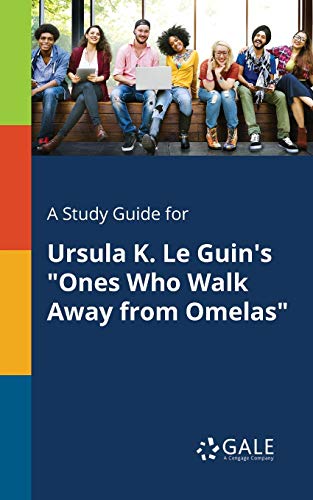
The people of Omelas know of the suffering of the child but have found a way to live with this knowledge and accept the terrible justice of reality (Guin, Ursula). The dumping of substandard goods in the Third World countries is an example of this. The city of Omelas represents a developed country, and the suffering child describes the deplorable conditions that exist in Third World countries. The story brings to light the oppression of underdeveloped nations by those that are developed such as the United States. For the good of many, the interests of the few have to be stepped on. The idea of a scapegoat s common even in our society today as we see in the decisions made during a war for instance. Most make peace with themselves and the few that do not eventually leave Omelas and what becomes of them we are not told, but the writer says, they seem to know where they are going, those who walk away from Omelas (Guin, Ursula). When children in Omelas come at an age where they begin to understand and are bothered by the suffering of the child, they are made to know that the happiness of all rests on this childs suffering. Hence, for the people of Omelas, it is logical that the plight of one child is a worthwhile price to pay for the happiness of all. Lifting the childs pain even for a second would mean throwing away the happiness of all in Omelas. The people of Omelas are aware of the childs presence and suffering but believe that the child has to suffer for the rest of the people to be happy. The child embodies the ancient idea of a scapegoat, someone who suffers for the sake of the rest of the more significant population (Brandt, Bruce). Most people just do nothing about the plight of those people only because they have been made to believe they cannot do a thing to change the situation of those suffering.
#The ones who walk away from omelas barnes and noble tv#
People are familiar with images of starving children on television and at times change TV stations so as not to see the disgusting and disturbing pictures of those suffering. The same is the case as in our modern society today where all are familiar with the suffering of others in other parts of the globe and even in the country. They are just filled with compassion for the child and disgust at the sight of it. The people of Omelas know about the suffering child and most have at least been at the prison where the suffering child is locked once but none has done anything to help the child. Through symbolism, Le Guin criticizes our society today where people are aware of the existence of evil but do nothing to help. Therefore, Omlelas is depicted as a city without any strict laws, but its inhabitants can maintain law and order by having a sense of responsibility. The people of Omelas live without religious leaders such as priests, yet religion exists. Despite the City portraying the aspects of a fairytale-like place, the people still enjoy the pleasures of drinking and other pleasures such as sexual pleasures though they do this responsibly. As the writer puts it I thought at first there were no drugs, but that is puritanical (Guin, Ursula). The people are disciplined and engage in leisure responsibly. Without these, Omelas is a peaceful city, and there is harmony. The people of Omelas neither have many laws nor a king or queen to rule over them to maintain the smooth flow of affairs. The story also brings out the theme of freedom. The writer describes the people of Omelas as a group that was happy yet not naive in any sense. The same society has lost its meaning of what constitutes happiness, and this according to Le Guin is treason. The writer criticizes the existing belief in our society that is promoted by sophisticates and pedants that pain is intellectual and regards happiness as something stupid. The writer says, although the people of Omelas were delighted, they were not simple folk, not dulcet shepherds, noble savages, bland utopians (Guin, Ursula). The writer challenges the notion that people who are happy are naive in the story. The people of Omelas even though saddened by the secret, are unable to do a thing to help, and therefore they are trapped in the false happiness in the city and are thus are not free. Omelas is not utopia as beneath the happiness on the surface lies a dark secret. The young ones are happy, and the adults are mature intelligent and passionate (Guin, Ursula). The narrators voice leaves a print on the story as throughout the story appears to pity the people of Omelas.

The story is told by a narrator who seems to sympathize with the situation of the people of Omela although their life appears to be perfect. Omelas cannot be referred to as utopia as the working of everything was close to perfect harmony, but all was not as it seemed. The short story The Ones Who Walk Away From Omelas is based on the daily lives of people of Omelas.


 0 kommentar(er)
0 kommentar(er)
